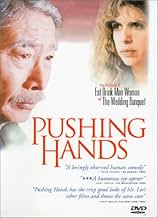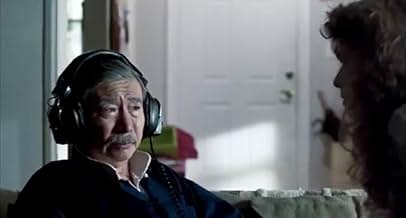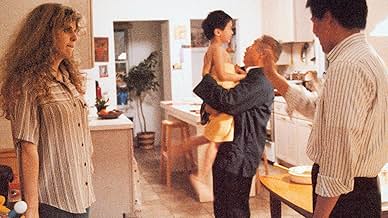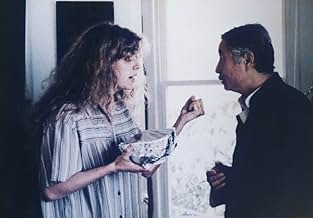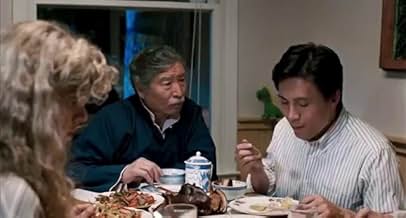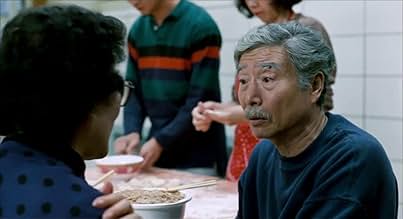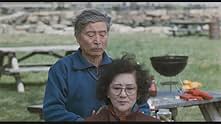CALIFICACIÓN DE IMDb
7.2/10
5.1 k
TU CALIFICACIÓN
Agrega una trama en tu idiomaAll the while, Master Chu tries to find his place in the foreign American world.All the while, Master Chu tries to find his place in the foreign American world.All the while, Master Chu tries to find his place in the foreign American world.
- Dirección
- Guionistas
- Elenco
- Premios
- 6 premios ganados y 7 nominaciones en total
Bozhao Wang
- Alex Chu
- (as Ye-tong Wang)
- Dirección
- Guionistas
- Todo el elenco y el equipo
- Producción, taquilla y más en IMDbPro
Opiniones destacadas
10Matador
Pushing Hands is Ang Lee's beautiful film about an elderly Chinese man transplanted into his son's American home. While most films about this subject, which for some reason critics like to call "East meets West", hyperbolize the struggles that immigrant Chinese must face, Pushing Hands tends to focus on minutia instead. For example, the elderly grandfather does not know that tin foil cannot be put into the microwave, which leads to a scolding by his caucasian daughter-in-law. All the conflict in the film is grounded in the real world, as opposed to some very abstract 'generational conflict'. Because of this I found this film to be much more rewarding than most other films about Asian-Americans. A must-see for Chinese-Americans and Caucasians alike. Personally, I'd like to watch it with my Chinese grandparents.
Listen for James Schamus's cameo as the voice on the answering machine at the beginning of the film.
Listen for James Schamus's cameo as the voice on the answering machine at the beginning of the film.
The adage of "Great things come in small packages" aptly applies to PUSHING HANDS/TUI SHOU. The film deftly tells its story with charm, humor and grace. A son's elderly father is the newest part of the family, and troubles therein lie. Essentially, it's a story of one family, yet could easily fit into many households. So many topics are breached, under the gentle, loving eye of the director (Ang Lee). The leads, the venerable Sihung Lung, Deb Snyder and Bo Z. Wang, do a credible job bringing this story to life. Recommended.
Ang Lee's first feature film, compared to "Eat Drink Man Woman," is a bit too neat and plain, but it still possesses the characteristic traits of Lee's later films - quiet and plain, yet captivating. It's truly miraculous that if this son were placed in another director's film, he would undoubtedly be detested, yet under Lee's direction, he evokes a sense of weakness without crossing into detestable territory. "The sun is shining, and I just want to stand here for a while. After all, no one is waiting for me. I'll forget about it after standing here for a while." This reminds me of my grandmother, who moved from her hometown to the city and struggled to adapt. Two weeks later, she insisted on going back. During most of the daytime, she would just sit on the balcony, soaking up the sun. I wonder what she was thinking at that time. Initially, I thought it was about cultural barriers, but later I realized it was much sadder. Cultural barriers can be temporarily overlooked through the efforts of both sides, but time and aging are forces that cannot be resisted.
'Pushing hands' refers to an exercise in tai chi where lightly touching each other, two practitioners learn to yield to and redirect a shared flow of energy. It's actually at the core of tai chi, a Chinese form of boxing built around Taoist principles of interconnected balance of opposites and emptiness in form.
Nearly impossible to make sense of in film, as is meditation and other internal arts of the East, because simply showing it, or worse in the light of mystical ability, obscures what it really is about. Ang Lee however tries in his first film, with mixed results.
Modeled to the story of an aging tai chi master who comes to America to stay with his son's family, there is what you'd expect from a film where East comes West; contrasts between two opposite ways of life, tradition versus modernity, love versus duty.
All that is pretty ordinary, and some obvious drama and questionable acting bring it further down. To be fair, for a low-budget student film, Lee shows considerable talent with a camera and has come far on this strength. All told, I'd rather celebrate his success story than Tarantino's. But let's see something more interesting from the Chinese perspective.
The overall point is finding a center of stillness in imbalanced life that is constantly in motion; in the film we see this in the old master's quest for a home and new life in a new country, somewhere to grow roots. This is the tao of balancing in the flow.
Life back in China isn't presented as ideal, we find that the old man has been persecuted all his life, and that his tai chi and calligraphy are the still spot he cultivates, his center in a moving universe of suffering. See how a phone ringing startles him from meditation, that is life that goes on.
In line with tai chi principles, all this means 'hard' in several moments of real life conflict, versus 'soft' in inwards reflection. There is a love interest in Mrs. Chen (soft, as feminine yin to his yang) who's in a similar situation as the old man and much gentle pushing and yielding to be close to her.
So how beautiful, if we could have the film as cinematic 'pushing hands' between lonely souls? And carry the flow from heavy drama to soft inner life, to what these people do to cool and express their ardor, she in her cooking, he in his calligraphy. Kar Wai makes it work, not quite so here.
Why is that? There's a scene of the old man watching videotapes of old Chinese kung fu movies, ridiculous from his perspective. The film is meant to offer next to other things a realistic depiction of his arts, fighting or otherwise, tied to realistic human connection as both soft.
But there are scenes like with the fat boy or in the restaurant, that in the end are as ridiculous as those movies, suddenly jerking us to fiction, obscuring what is vital in his art; and mirroring that, there's a sense of inflated drama in emotional moments. But Lee is too talented for us to be able to easily discard the whole work.
The Western perspective, introduced later in the film by the son, is that his father's internal arts may be his way of shutting off the outside world, keeping from being touched perhaps related to the tragic loss of his wife. All through the film, we see that he likes Mrs. Chen but is reluctant to be close to her.
Now watch again the last scene where he teaches tai chi in the Chinese community center, now the 'hero of Chinatown'. Watch how we first see him doing the motions, then with a soft flow of the camera materializes behind him as though out of thin air an entire class of students. And who enters as if by chance? Mrs. Chen.
Now 'soft' is what we see of his heart, 'hard' what we imagine as taking place in his head.
See how lightly the real and unreal touch, how smooth the parallel flow. So you can afford to miss the rest but not this last moment, it's expertly done and too delicious to ignore.
Nearly impossible to make sense of in film, as is meditation and other internal arts of the East, because simply showing it, or worse in the light of mystical ability, obscures what it really is about. Ang Lee however tries in his first film, with mixed results.
Modeled to the story of an aging tai chi master who comes to America to stay with his son's family, there is what you'd expect from a film where East comes West; contrasts between two opposite ways of life, tradition versus modernity, love versus duty.
All that is pretty ordinary, and some obvious drama and questionable acting bring it further down. To be fair, for a low-budget student film, Lee shows considerable talent with a camera and has come far on this strength. All told, I'd rather celebrate his success story than Tarantino's. But let's see something more interesting from the Chinese perspective.
The overall point is finding a center of stillness in imbalanced life that is constantly in motion; in the film we see this in the old master's quest for a home and new life in a new country, somewhere to grow roots. This is the tao of balancing in the flow.
Life back in China isn't presented as ideal, we find that the old man has been persecuted all his life, and that his tai chi and calligraphy are the still spot he cultivates, his center in a moving universe of suffering. See how a phone ringing startles him from meditation, that is life that goes on.
In line with tai chi principles, all this means 'hard' in several moments of real life conflict, versus 'soft' in inwards reflection. There is a love interest in Mrs. Chen (soft, as feminine yin to his yang) who's in a similar situation as the old man and much gentle pushing and yielding to be close to her.
So how beautiful, if we could have the film as cinematic 'pushing hands' between lonely souls? And carry the flow from heavy drama to soft inner life, to what these people do to cool and express their ardor, she in her cooking, he in his calligraphy. Kar Wai makes it work, not quite so here.
Why is that? There's a scene of the old man watching videotapes of old Chinese kung fu movies, ridiculous from his perspective. The film is meant to offer next to other things a realistic depiction of his arts, fighting or otherwise, tied to realistic human connection as both soft.
But there are scenes like with the fat boy or in the restaurant, that in the end are as ridiculous as those movies, suddenly jerking us to fiction, obscuring what is vital in his art; and mirroring that, there's a sense of inflated drama in emotional moments. But Lee is too talented for us to be able to easily discard the whole work.
The Western perspective, introduced later in the film by the son, is that his father's internal arts may be his way of shutting off the outside world, keeping from being touched perhaps related to the tragic loss of his wife. All through the film, we see that he likes Mrs. Chen but is reluctant to be close to her.
Now watch again the last scene where he teaches tai chi in the Chinese community center, now the 'hero of Chinatown'. Watch how we first see him doing the motions, then with a soft flow of the camera materializes behind him as though out of thin air an entire class of students. And who enters as if by chance? Mrs. Chen.
Now 'soft' is what we see of his heart, 'hard' what we imagine as taking place in his head.
See how lightly the real and unreal touch, how smooth the parallel flow. So you can afford to miss the rest but not this last moment, it's expertly done and too delicious to ignore.
When I was in class that day, I asked the students what did the "pushing hand" say? Almost all of them, including those who haven't seen "Pushing Hands", answer the collision between Chinese and Western cultures, so I wonder why it is so unified. After reading Baidu Encyclopedia, I understand! What is the "homesickness" is indeed the standard of the central idea, but there is no performance in the movie, and it is not allowed to pay for the payment.
Inserting a digression, about the very interesting thing about this film, on the day of the release of "Pusher", the box office was flat. On the same day, I won nine nominations at the Golden Horse Award, and after winning the best actor, supporting actress and special prize, the box office immediately after the next day. Big rise. It seems that we have to hear about it, only to know it. After reading the comments, we know what the movie is about?
"Pushing Hands" Virgo is often the most like the author himself, so "Pushing Hands" is very good, and the sharp parts are hidden under the gentle and popular narrative.
The whole film is staring at Lao Zhu alone, so look at "Pushing Hands" and see Lao Zhu.
Taijiquan Professor Zhuo-Taiji Pusher, in the words of Lao Zhu in the film, is: We practice the inner family, pay attention to refining the spirit, practicing the spirit, and waiting for the level of refining the spirit, it is very It's hard to practice again.
Lao Zhu is an old man who admits to lose.
I practiced pushing my hand to teach Lao Zhu at this level, but I feel that life has become utterly weak.
The loneliness and emptiness faced after retirement were all due to the reason that the son came to the United States, and the son married the wife of the foreign woman. All the pressure was passed on to his son and he could see it in the next minute.
So Lao Zhu did not accept his life and wanted to fight.
Teaching Tai Chi in Chinatown, the action after meeting Chinese Mrs. Chen is completely like a boy in first love.
Later, after the hope was shattered, Lao Zhu still refused to admit defeat and left home!
This "jailbreak" failed again. In the face of the humiliation of the restaurant owner, Lao Zhu's bloody Fang's defeat of the "enemy" still lost his cultivation.
¿Sabías que…?
- ErroresThe son, Alex, has physiognomy that is unmistakably that of someone Beijing, and the actor speaks with a Beijing accent, but the father, who demonstrates Taiwanese cultural practices, has the appearance of someone from farther south, such as near Shanghai. Regardless of whom the father might have married, the couple could not have produced a child with such Northern characteristics. This is a casting error more than a character error.
- ConexionesFeatured in Century of Cinema: Naamsaang-neuiseung (1996)
Selecciones populares
Inicia sesión para calificar y agrega a la lista de videos para obtener recomendaciones personalizadas
- How long is Pushing Hands?Con tecnología de Alexa
Detalles
- Fecha de lanzamiento
- Países de origen
- Idiomas
- También se conoce como
- Pushing Hands
- Locaciones de filmación
- Productoras
- Ver más créditos de la compañía en IMDbPro
Taquilla
- Presupuesto
- USD 400,000 (estimado)
- Total en EE. UU. y Canadá
- USD 152,322
- Fin de semana de estreno en EE. UU. y Canadá
- USD 9,567
- 4 jun 1995
- Total a nivel mundial
- USD 152,322
Contribuir a esta página
Sugiere una edición o agrega el contenido que falta


